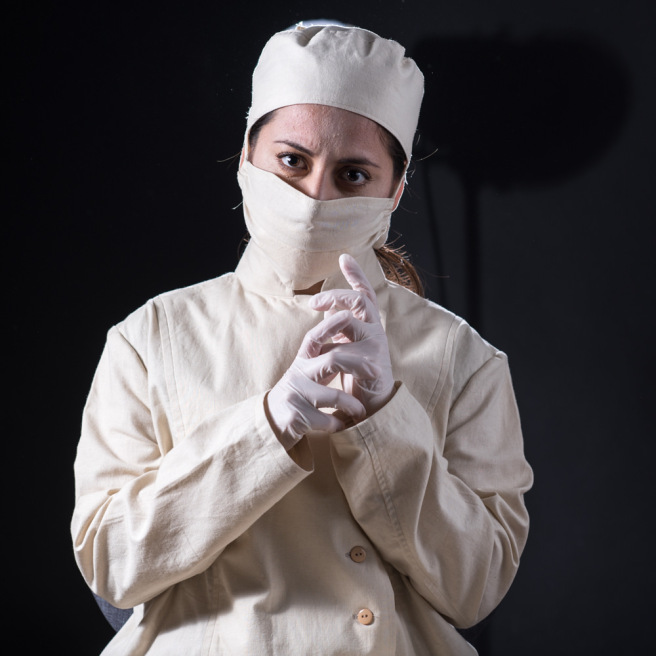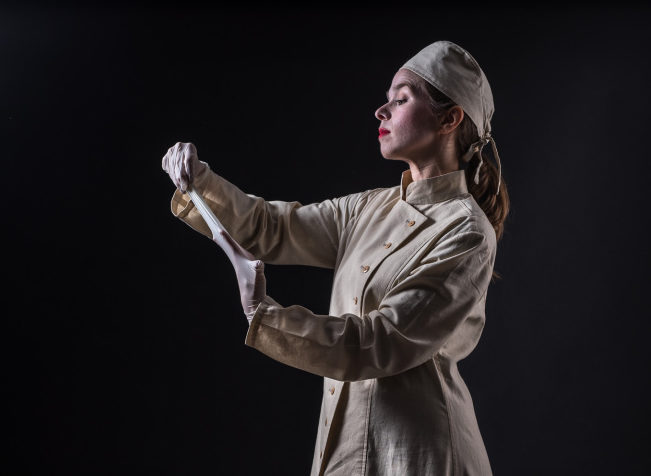
BY: MERI PERRA
If you’re of a certain age and lived in Canada, you likely remember this classic Heritage Minute featuring neurosurgeon Dr. Wilder Penfield.
Taliesin McEnaney remembers the commercial well. A theatre professional with over 16 years acting, writing, producing and directing experience, McEnaney’s family tree includes a spirit channeling grandmother, Claire Ward. One of the spirits Ward channelled was Dr. Penfield. (For the record, Ward’s relationship with the deceased Penfield began in 1980, well before the line ‘I smell burnt toast’ became Heritage Minute famous in 1991.)
Also, McEnaney has a family member who lives with brain injury.
“I was researching epilepsy and seizures and Dr. Wilder Penfield was coming up quite a bit,” McEnaney said. “I was remembering he was [one of] my granny’s spirit guides. So I asked my aunt for all her writings and there are like 200 pages of typed up transcripts.”
After pouring through her grandmother’s notes, researching Dr. Penfield’s work and spending a year collaborating with four actors, McEnaney’s play, Brain Storm, about a woman trying to navigate through her new reality of living with brain injury, hit the Toronto Fringe Festival this week, and runs until July 15th.
(BIST Members can see Brain Storm for FREE on July 13th, and after join McEnaney to discuss the play. You must register in advance, HERE.)
“One of the ways [the main character, Kate] tries to [come to terms with her brain injury] is she turns to her grandmother, who is dead and had previously been a medium,” McEnaney said. “One of the messages she had channelled was from Dr. Wilder Penfield, and the message was that the mind goes on after death.”
Penfield’s work fascinates McEnaney because the neurosurgeon was able to change people’s reality – what they saw, smelled or heard – simply by placing electrodes on different parts of their brain. In Penfield’s book, The Mystery of the Mind: A Critical Study of Consciousness and the Human Brain Penfield theorizes that life after death is possible, if the mind can find a different source of energy. The brain, Penfield believes, is what fuels the mind.
From what McEnaney has experienced through her family member, this is similar to some of the effects of brain injury. A person’s injured brain may be unable to filter sounds and images, creating an intensity which is often overwhelming, leading to the question of what is reality and what is not.
“Without brain injury, we’re moving through the world not hearing so many things, not seeing so many things because the brain is filtering so we can focus,” McEnaney said. “When you are brain injured, everything is coming in at once and you’re becoming overstimulated because the reality is so intense. It’s like, ok whose reality is it?”
For McEnaney, it’s not important whether her grandmother really channelled spirits. (Though Ward’s notes on Dr. Penfield mimic his writings, which Ward had never read before she began channelling him.) But what is important is that her play opens up a conversation in the brain injury community.
“Every brain injury is different, and so is the one that you see in the show, but I think there are some commonalities that people will recognize,” McEnaney said.
Register HERE to see Brain Storm on July 13th with BIST!
If you can’t come with BIST on July 13th, you can buy tickets for Brain Storm HERE.
BRAIN STORM is co-created and performed by Hayley Carr, Maïza Dubhé, Shayna Virginillo, and Alexandra Montagnese. Conceived of and directed by Taliesin McEnaney, set and costume designed by Will Bezek with lighting design by Claire Hill.
Thanks to our Event Sponsor

Filed under: ABI in the media, Awareness, BIST Event, Caregiving, Members’ Stories
![]()
IMAGES COURTESY OF LUCID LUDIC





